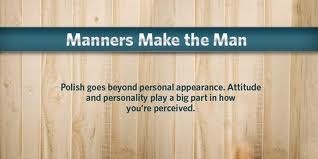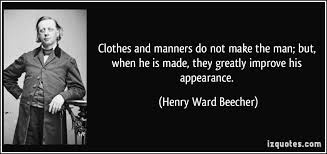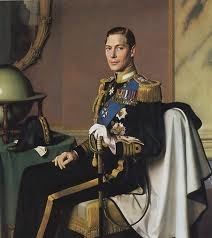 “Manners make the man” was the motto of William of Wykeham, the great scholar of Winchester of days of Edward III.
“Manners make the man” was the motto of William of Wykeham, the great scholar of Winchester of days of Edward III. This meant that, a man is almost always what his manners are. He attached great importance to manners in life. Indeed in a more matter of fact sense, manners do make the man. The success or failure of a man in life is more frequently a matter of manners than that of anything else.
This meant that, a man is almost always what his manners are. He attached great importance to manners in life. Indeed in a more matter of fact sense, manners do make the man. The success or failure of a man in life is more frequently a matter of manners than that of anything else.  Moralists attach good deal of importance to good manners. Bishop Middleton said, “Virtue itself offends when coupled with forbidding manners” Paley said, “Manners are minor morals” Sir Walter Raleigh once remarked, “Better were it to be unborn than to be ill-bred” Bartol says, “Good manners and good morals are sworn friends and fast allies” Life style of Holy Prophet (P.B.U.H) was an embodiment of good manners. In practical life we find that good manners go a long way in conciliating enemies and making friends. Lady Mary Wortley Montague once said, “Civility cost nothing and buys everything” A courteous and pleasant manner always creates a favourable impression. Strangers are usually impressed favourably or unfavourably by manners of man.
Moralists attach good deal of importance to good manners. Bishop Middleton said, “Virtue itself offends when coupled with forbidding manners” Paley said, “Manners are minor morals” Sir Walter Raleigh once remarked, “Better were it to be unborn than to be ill-bred” Bartol says, “Good manners and good morals are sworn friends and fast allies” Life style of Holy Prophet (P.B.U.H) was an embodiment of good manners. In practical life we find that good manners go a long way in conciliating enemies and making friends. Lady Mary Wortley Montague once said, “Civility cost nothing and buys everything” A courteous and pleasant manner always creates a favourable impression. Strangers are usually impressed favourably or unfavourably by manners of man. They do not have the advantage or opportunities of longer acquaintances. Even among friends and acquaintances good manners count for much. Much is forgiven to a man who talks civilly and is courteous in his demeanour. The Merry Monarch of England, Charles II, enjoyed a large amount of popularity with his subjects though he had betrayed, sold and disgraced them, and this was due to his excellent and kindly manners. Chesterfield, a thinker of that age has rightly said, “Good manners are the settled medium of social, as specie is of commercial life: returns are equally expected from both; and people will no more advance their civility to a bear than their money to a bankrupt” A man of polished manners sweetens social intercourse. Nothing vicious or offensive can be uttered by any one in his company. It is said of Franklin that in the days when he was working man, he reformed the manners of an entire workshop. There is reciprocity in these matters. If one is polite to a man, the later is bound to be polite in return. It is generally seen that harsh, rude and tactless words cause more pain and trouble than actual wrong or injustice. Those in authority often forget that they should not treat their subordinates in a rude way, a rude; manner less man seldom commands the respect of his subordinates.
They do not have the advantage or opportunities of longer acquaintances. Even among friends and acquaintances good manners count for much. Much is forgiven to a man who talks civilly and is courteous in his demeanour. The Merry Monarch of England, Charles II, enjoyed a large amount of popularity with his subjects though he had betrayed, sold and disgraced them, and this was due to his excellent and kindly manners. Chesterfield, a thinker of that age has rightly said, “Good manners are the settled medium of social, as specie is of commercial life: returns are equally expected from both; and people will no more advance their civility to a bear than their money to a bankrupt” A man of polished manners sweetens social intercourse. Nothing vicious or offensive can be uttered by any one in his company. It is said of Franklin that in the days when he was working man, he reformed the manners of an entire workshop. There is reciprocity in these matters. If one is polite to a man, the later is bound to be polite in return. It is generally seen that harsh, rude and tactless words cause more pain and trouble than actual wrong or injustice. Those in authority often forget that they should not treat their subordinates in a rude way, a rude; manner less man seldom commands the respect of his subordinates. They may fear him, but they will never love him. It is also seen that some self-righteous men consider it their duty to wound the feelings of those who are known to be guilty of some moral offence or have some weakness. These men needlessly give pain and make enemies. Since good manners are so highly regarded by moralists and thinkers, there must be something essentially good in them. Manners are not a matter of outward show only. Real courtesy cannot be a surface matter. Good manners spring from heart. A man, who only assumes good manners to gain certain end, cannot keep up the pretence always. His real self must come out then.
They may fear him, but they will never love him. It is also seen that some self-righteous men consider it their duty to wound the feelings of those who are known to be guilty of some moral offence or have some weakness. These men needlessly give pain and make enemies. Since good manners are so highly regarded by moralists and thinkers, there must be something essentially good in them. Manners are not a matter of outward show only. Real courtesy cannot be a surface matter. Good manners spring from heart. A man, who only assumes good manners to gain certain end, cannot keep up the pretence always. His real self must come out then. George IV, who was described as the “first gentleman of Europe” could not keep up the pretence of good manners before his servants. He was thus found out. It is a common experience that we cannot even assume good manners without exercising good deal of self-control.
George IV, who was described as the “first gentleman of Europe” could not keep up the pretence of good manners before his servants. He was thus found out. It is a common experience that we cannot even assume good manners without exercising good deal of self-control. True courtesy cannot be practiced without exercising patience, self-denial, unselfishness and many other similar virtues.
True courtesy cannot be practiced without exercising patience, self-denial, unselfishness and many other similar virtues. You cannot be chivalrous toward a lady unless you have real respect for womanhood. You cannot be kind and considerate toward your servant unless you control your irritability and selfishness. On the other hand if you are surly and rude to your servant, you may soon become surly and rude to your friends. A man of cold manners is seldom considerate. Good manners have thus great importance in human life. Smiles rightly says, “Good manners which give colour to life, are of great importance than laws, which are but one of their manifestations. The law touches us here and there, but manners are about us everywhere.” Written By: Syed Faiz Mujtaba
You cannot be chivalrous toward a lady unless you have real respect for womanhood. You cannot be kind and considerate toward your servant unless you control your irritability and selfishness. On the other hand if you are surly and rude to your servant, you may soon become surly and rude to your friends. A man of cold manners is seldom considerate. Good manners have thus great importance in human life. Smiles rightly says, “Good manners which give colour to life, are of great importance than laws, which are but one of their manifestations. The law touches us here and there, but manners are about us everywhere.” Written By: Syed Faiz Mujtaba
MANNERS MAKE THE MAN
Posted on at



